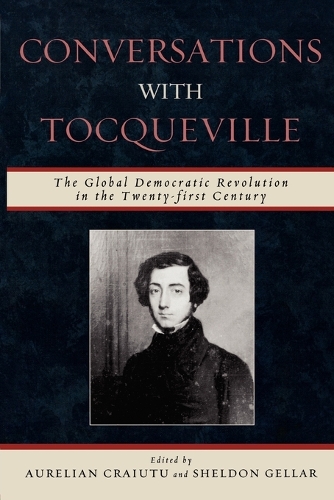
Conversations with Tocqueville: The Global Democratic Revolution in the Twenty-first Century
(Paperback)
Publishing Details
Conversations with Tocqueville: The Global Democratic Revolution in the Twenty-first Century
By (Author) Aurelian Craiutu
Edited by Sheldon Gellar
Foreword by Elinor Ostrom
Foreword by Vincent Ostrom
Contributions by Elinor Ostrom
Contributions by Aurelian Craiutu
Contributions by Barbara Allen
Contributions by Charles A. Reilly
Contributions by Gustavo Gordillo de Anda
Contributions by Krister Andersson
Bloomsbury Publishing PLC
Lexington Books
16th February 2009
United States
Classifications
Professional and Scholarly
Non Fiction
Globalization
Comparative politics
Political science and theory
321.8
Physical Properties
Paperback
352
Width 153mm, Height 231mm, Spine 15mm
531g
Description
The questions and issues raised by Tocqueville in his monumental studies of France and America are just as crucial for understanding the evolution of democracy in the West and the development of democracy in the non-western world. They clearly show the breadth of Tocqueville's contributions to the development of modern social sciences. Among the questions addressed by Tocqueville were: How does the weight of the past affect the evolution of political institutions and political behavior What impact do differences in physical environment have on the organization of society What are the relationships between social equality, freedom, and democracy To what extent does centralization destroy the capacity for local initiative and self-governance What conditions are needed to nurture the flourishing of self-governing communities What safeguards are needed to preserve freedom and to prevent incipient democracies from becoming dictatorships Why has democracy had such a problem taking hold in many parts of the non-western world How should one study democracy in non-western settings Tocquevillian analytics can help us provide answers.
Addressed to a wider audience than Tocqueville scholars, the book argues that Tocquevillian analytics can be used to understand developments in non-western as well as western societies and be updated to address such issues as globalization, ethnicity, New World-Old World comparisons, and East-West dynamics. The first part of the book examines the basic components of Tocquevillian analytics, outlining its stepwise, interdisciplinary approach to understanding societies and nations. The second part applies the Tocquevillian conceptual framework to the contemporary world and contains individual chapters on various regions of the worldNorth America, Russia, Western Europe, Asia, Africa, and Latin America. Unlike previous collective works on Tocqueville,Conversations with Tocqueville does not offer a survey of the authors' views, but instead focuses on presenting a cohesive
Reviews
Conversations with Tocqueville is a stimulating book, full of powerful and provocative ideas. Aurelian Craiutu and Sheldon Gellar have produced a first-rate collection that significantly enhances our understanding of Tocqueville as a social scientist and shows how his mode of analysis, faithfully recast in the form of Tocquevillian analytics, can be used to uncover and assess the rich diversity of contemporary efforts to achieve democracy in different regions of the world. A masterful blend of political theory and comparative analysis. -- Filippo Sabetti, McGill University
In the introduction to Democracy in America, Tocqueville famously observed that a great 'democratic revolution' was in the process of radically transforming the entire civilized world. That 'revolution' might bring with it liberty or new and unprecedented forms of despotism, but it would surely bring an endsooner in some cases, later in othersto all the 'old regimes' in the world. This splendid collection deepens our understanding of Tocquevilles thought and allows us to better understand the 'democratic revolution' as it has unfolded over the last century and a half from Paris and Moscow to Tokyo and beyond. It will be of interest to students of political theory and comparative politics and to thoughtful citizens as such. -- Daniel J. Mahoney, Assumption College
Compellingly coherent...an audacious engagement with Tocqueville's notion of democracy and its semantic frontiers. * Journal of Democracy *
The variety of methodological and ideological perspectives mirrors Tocqueville's own multifaceted approach.Such a reactualization of Tocqueville's analytics, especially in light of today's global economic and financial crisis, can both prompt a broad audience to reconsider its perspectives on the challenges currently facing democracy, and challenge any scholars still hanging on to the pernicious ideal of a value-free social science. -- Alin Fumurescu * Perspectives on Political Science *
Conversations with Tocqueville is a masterly demonstration that Tocqueville's analysis of democracy remains not only relevant in the twenty-first century, but essential. Tocqueville wrote of democracy in America to instruct democracies everywhere, and fittingly the essays of this volume ably adapt Tocqueville's central themes and questions to a variety of nations and circumstances. It is a rich and thoughtful collection informed by Tocqueville's capacious hopes for, and fears about, democracy, and will be of benefit to anyone interested in our diverse democratic future. -- Patrick Deneen, Georgetown University
Author Bio
Aurelian Craiutu is associate professor of political science at Indiana University and author of Liberalism under Siege: The Political Thought of the French Doctrinaires, Le Centre introuvable, and In Praise of Moderation.
Sheldon Gellar is a research associate at Indiana Universitys Workshop in Political Theory and Policy Analysis and author of Democracy in Senegal: Tocquevillian Analytics in Africa, Structural Changes and Colonial Dependency: Senegal 18851945, and Senegal: An African Nation Between Islam and the West.
